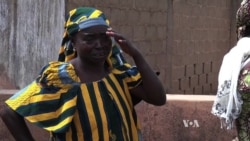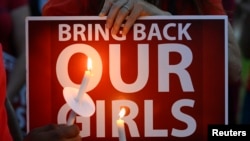JOS, NIGERIA —
Families in the central Nigerian city of Jos flocked to the city morgue Friday, searching for victims of twin car bomb blasts that killed at least 130.
The terror attacks on Tuesday came amid a surge of deadly violence in Africa’s most populous nation. They also came as outrage continued to mount about government efforts to stem the growing threat from the Islamic militant group Boko Haram, which in April abducted hundreds of school girls.
There hasn’t been any claim of responsibility for the blasts which hit an outdoor market and near a teaching hospital.
Witnesses said authorities did not respond to reports of an abandoned white van that sat for five hours before exploding outside the market.
Outside the city morgue, Chris Obele said he and his father were searching for Chris’ brother, Michael, who was a medical student who had been at the teaching hospital.
As the two emerged from inside the building, Chris held his father's shoulder tight, their grief visible.
Theresa Nwafor said her entire family was looking forward to the graduation of her eldest daughter Francisca, 24, who was killed in the blast.
“She's been promising us a lot of things. 'Mommy, don't worry. Mommy, don't worry. That when I graduate I'm going to do a lot of things for you. I'm going to change the family. I'm going to do this,’” Nwafor said. “She is a promising child. She was a promising child."
Outside the family house, dozens of relatives and community members assembled to mourn Francisca. Her father, Humphrey, said he asks himself why this happened.
"I don't see a reason," he said. "It is inhuman."
At least seven students have been identified, but Peter Omo-Erigbe, of the Nigerian Federation of Evangelical Students, says they’re looking for more.
"Some of the victims that we saw, some of them, their heads are not there. Some of them, their faces are bruised. So we can hardly identify the ones that are our students,” Omo-Erigbe said. “These ones were able to identify because their faces were still intact.”
The violence is believed to be the work of Boko Haram, a militant Islamic sect that has waged a terror campaign over the past five years against what it says is corruption of Islamic values by the West. The group is fighting to set up its version of an Islamic state in northern Nigeria
Militants have been raiding villages and killing residents by the hundreds this year in the so-called security zones of northeastern Nigeria. Since April, they have extended their reach, bombing the northern city of Kano and a busy bus station in the capital, Abuja, twice.
Boko Haram’s abduction of hundreds of schoolgirls in April has garnered global outrage, including public condemnation by first lady Barack Obama, who said she and President Barack Obama were "outraged and heartbroken.” The Twitter hashtag #bringbackourgirls has gone viral, and caught the attention of celebrities across the globe.
Nigerians have grown outraged at what many see as the government’s inability to halt the violence, and rescue the schoolgirls.
Schools closed across the nation Wednesday in protest of what teachers said are the government's failings.
In the northeastern capital of Maiduguri, the Nigeria Union of Teachers said it was protesting more than just the abduction of the girls. The union says 173 teachers have been killed in the three northeastern states of Borno, Adamawa and Yobe in the past five years.
Abdulkareem Haruna contributed to this report from Maiduguri, Nigeria.
Boko Haram
Boko Haram
- Based in the northeastern city of Maiduguri
- Self-proclaimed leader is Abubakar Shekau
- Began in 2002 as a nonviolent Islamist splinter group
- Launched uprising in 2009
- Has killed tens of thousands since 2010
- Boko Haram translates to "Western education is sinful"
- Wants Nigeria to adopt strict Islamic law
There hasn’t been any claim of responsibility for the blasts which hit an outdoor market and near a teaching hospital.
Witnesses said authorities did not respond to reports of an abandoned white van that sat for five hours before exploding outside the market.
Outside the city morgue, Chris Obele said he and his father were searching for Chris’ brother, Michael, who was a medical student who had been at the teaching hospital.
As the two emerged from inside the building, Chris held his father's shoulder tight, their grief visible.
Theresa Nwafor said her entire family was looking forward to the graduation of her eldest daughter Francisca, 24, who was killed in the blast.
“She's been promising us a lot of things. 'Mommy, don't worry. Mommy, don't worry. That when I graduate I'm going to do a lot of things for you. I'm going to change the family. I'm going to do this,’” Nwafor said. “She is a promising child. She was a promising child."
Outside the family house, dozens of relatives and community members assembled to mourn Francisca. Her father, Humphrey, said he asks himself why this happened.
"I don't see a reason," he said. "It is inhuman."
At least seven students have been identified, but Peter Omo-Erigbe, of the Nigerian Federation of Evangelical Students, says they’re looking for more.
"Some of the victims that we saw, some of them, their heads are not there. Some of them, their faces are bruised. So we can hardly identify the ones that are our students,” Omo-Erigbe said. “These ones were able to identify because their faces were still intact.”
The violence is believed to be the work of Boko Haram, a militant Islamic sect that has waged a terror campaign over the past five years against what it says is corruption of Islamic values by the West. The group is fighting to set up its version of an Islamic state in northern Nigeria
Militants have been raiding villages and killing residents by the hundreds this year in the so-called security zones of northeastern Nigeria. Since April, they have extended their reach, bombing the northern city of Kano and a busy bus station in the capital, Abuja, twice.
Boko Haram’s abduction of hundreds of schoolgirls in April has garnered global outrage, including public condemnation by first lady Barack Obama, who said she and President Barack Obama were "outraged and heartbroken.” The Twitter hashtag #bringbackourgirls has gone viral, and caught the attention of celebrities across the globe.
Nigerians have grown outraged at what many see as the government’s inability to halt the violence, and rescue the schoolgirls.
Schools closed across the nation Wednesday in protest of what teachers said are the government's failings.
In the northeastern capital of Maiduguri, the Nigeria Union of Teachers said it was protesting more than just the abduction of the girls. The union says 173 teachers have been killed in the three northeastern states of Borno, Adamawa and Yobe in the past five years.
Abdulkareem Haruna contributed to this report from Maiduguri, Nigeria.







